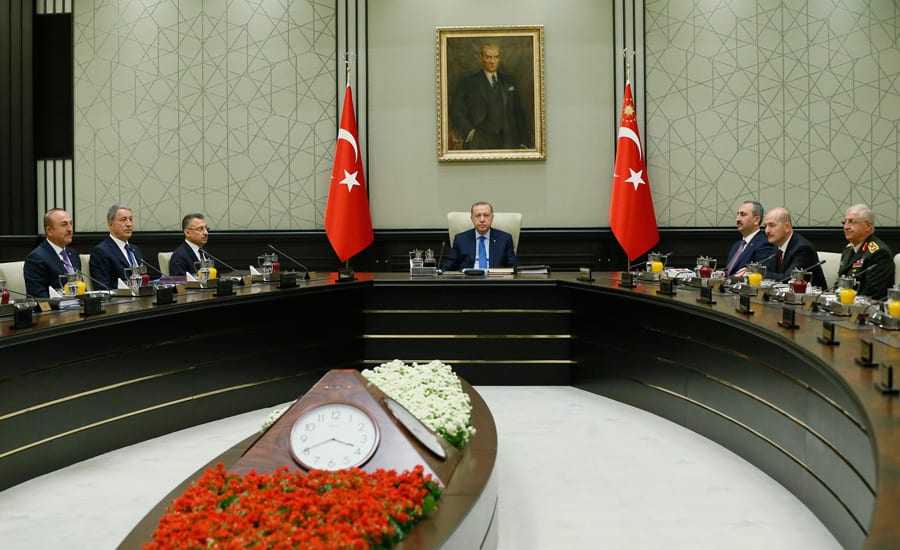For Erdogan, there is no easy way out, primarily because he has conflated what is good for him personally with what is good for Turkey.
By Oliver Wright, Arab Weekly
“You can fool all the people some of the time and some of the people all the time but you can’t fool all the people all the time.”
Turks are feeling the pain as the long-forecast economic storm finally breaks. Among other consequences, the fallout threatens to erode support for President Recep Tayyip Erdogan.
To deflect blame for the debacle, Erdogan and his chorus in Turkey’s largely subservient media doubled down on a tried-and-trusted narrative that portrays Turkey as a rising star whose inevitable ascent a merry-go-round cast of rivals and ne’er-do-wells are intent on thwarting. Latest in the firing line is the United States, accused, among other things, of having initiated an economic war against Ankara.
Regardless of the extent to which such assertions reflect reality, they serve the useful purpose of keeping Erdogan’s support base onside as economic pain grows but promulgating this narrative has an obvious downside.
Turkey’s economy depends on foreign investment and much of the cash comes from the United States and Europe, another prominent villain in Erdogan’s narratives. For years, Erdogan got away with this because investors viewed his rhetoric as meant for domestic consumption and did not reflect his real beliefs.
This has changed, especially since a meeting between Erdogan and investors in May that wrecked Erdogan’s credibility in financial circles because financiers began to take unorthodox economic pronouncements at face value — and the replacement of Finance Minister Mehmet Simsek with the president’s son-in-law .
Subsequently, Western investors became increasingly reluctant to put money into Turkey, accelerating the economic deterioration. As Turkey’s economy foundered, so Erdogan, in turn, voiced increasingly divisive and conspiratorial explanations, further alienating Western capital.
The situation amounts to a feed-forward loop, one in which increasing economic problems engender increasingly hostile conspiracy theories that further undermine the economy.
How long this can go on is anyone’s guess. Erdogan and his advisers must know what is happening. They are likely aware that their long-term efforts to reduce dependence on Western finance, by securing alternative sources of investment and promoting a more self-sufficient economic model, are not progressing fast enough to save the day.
Neither is the shorter-term strategy of cosying up to Europe likely to pay dividends. Turkey’s credibility is shot. European governments have not forgotten occasions in the recent past when they played the role of Turkey’s villain. Investors, likewise, have little faith in a country where the rule of law collapsed as Erdogan cemented his grip on power.
This bodes for a long, cold winter in Turkey.
For Erdogan, there is no easy way out, primarily because he has conflated what is good for himself personally with what is good for Turkey.
Erdogan has shown himself capable of pragmatic turns on numerous occasions in the past, recently in his attempt at rapprochement with the European Union, some of whose leaders he labelled, not so long ago, “Nazi remnants.” That he might pull a similar volte-face over issues with the United States is possible and Turkey’s media have shown themselves adept at brewing amnesia-inducing potions to feed the captive domestic audience.
Turkey’s economic problems are deep-rooted, so reforms needed to get it on track will be painful and prolonged. Such an approach would leave Erdogan vulnerable to losing face and support, without achieving immediate tangible results.
The alternative is to let the economy burn, keep blaming it on little green men and trust the media to sell it to the populace. Should the spin not be entirely successful, there is always the option, again well-honed, of demonising those who object, irrespective of prior records of loyalty. The police have plenty of experience in suppressing dissent on the streets.
Because Erdogan seems to believe many of the eye-watering theories he airs, this approach has the benefit of conforming to his self-image as honest, heart-on-the-sleeve man of the Muslim people who acts on his conviction.
Erdogan may also fail to grasp the consequences of such a course of action, even as it unfolds. He is isolated and insulated in his palace, shielded by filters and advisers who are, for the most part, no less unconsciously self-serving than he. They will ensure that, as the pain increases, the messages penetrating the inner sanctum are screened such that the voices of those citizens who say they consider the economic hardship worthwhile are represented as the norm.
The chances of Erdogan overseeing a meaningful recovery of the Turkish economy, therefore, appear slim. He is out of touch, out of date and, increasingly, out of time. Besides, it was Erdogan who got Turkey into this mess, so it is unlikely he can get it out. Those who believe he can consist of his cynical loyalists who profit from it and the foolish.









